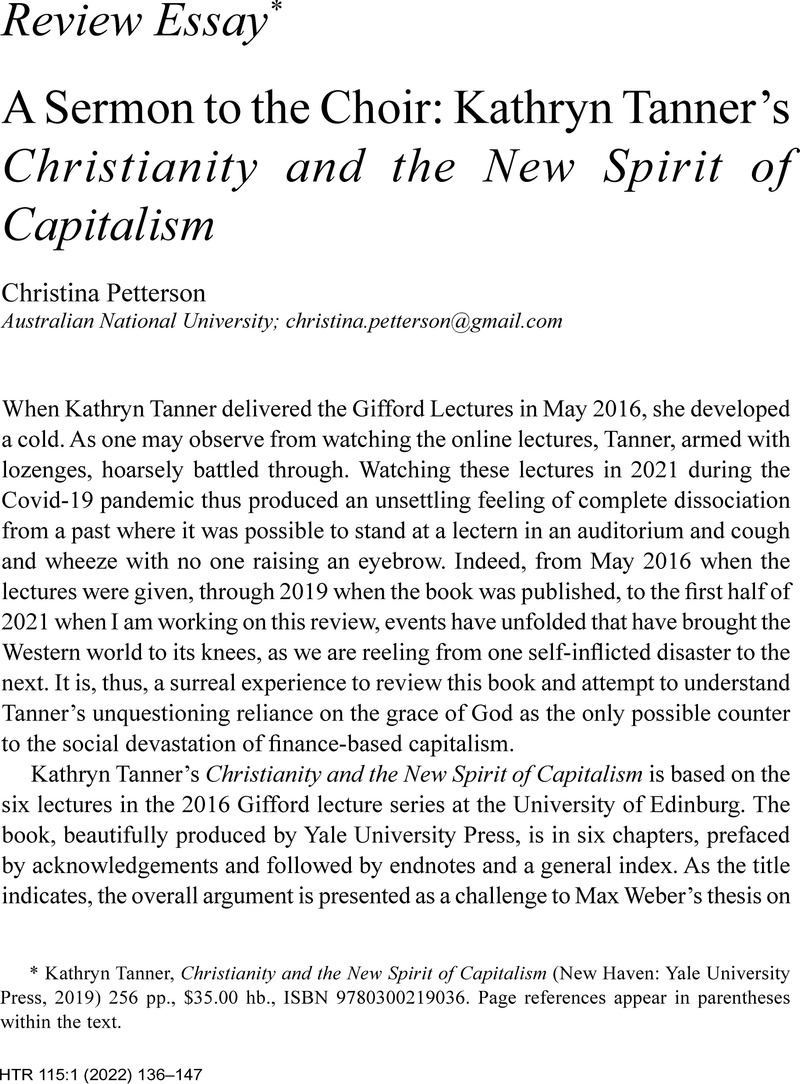No CrossRef data available.
Article contents
A Sermon to the Choir: Kathryn Tanner’s Christianity and the New Spirit of Capitalism
Published online by Cambridge University Press: 24 February 2022
Abstract

- Type
- Review Essay
- Information
- Copyright
- © The Author(s), 2022. Published by Cambridge University Press on behalf of the President and Fellows of Harvard College
Footnotes
Kathryn Tanner, Christianity and the New Spirit of Capitalism (New Haven: Yale University Press, 2019) 256 pp., $35.00 hb., ISBN 9780300219036. Page references appear in parentheses within the text.
References
1 Max Weber, The Protestant Ethic and the Spirit of Capitalism (Routledge Classics; London: Routledge, 2001).
2 In the lectures, available online at https://www.giffordlectures.org/lectures/christianity-and-new-spirit-capitalism, Tanner is much more circumspect in her description of Weber’s methodology.
3 C. B. Macpherson, The Political Theory ofPossessive Individualism: Hobbes to Locke (Oxford: Clarendon Press, 1962).
4 “Although everyone wants what everyone else wants here—to live a life transparent to the life of Christ within one—members do not compete with one another for those same goods because of a certain detachment from those goods that the relationship to that third thing, God, enables. God functions here something like the way money functions: to allow one to give up one’s attachments to the achievements that others would also like for themselves” (Tanner, 215).
5 I have discussed this at length in Christina Petterson, The Missionary, the Catechist and the Hunter: Foucault, Protestantism and Colonialism (ed. Warren Goldstein; Studies in Critical Research on Religion (Leiden: Brill, 2014) 55-72. Drawing on Michel Foucault, “What Is Critique?,” in What Is Enlightenment? Eighteenth-Century Answers and Twentieth-Century Questions (ed. James Schmidt; Berkeley: University of California Press, 1996 [1978]); idem, Security, Territory, Population: Lectures at the Collège De France, 1977-1978 (ed. Arnold I. Davidson; trans. Graham Burchell; Michel Foucault, Lectures at the Collège De France; London: Palgrave Macmillan, 2007); Matthew Chrulew, “Pastoral Counter-Conducts: Religious Resistance in Foucault’s Genealogy of Christianity,” Critical Research on Religion 2 (2014) 55-65; idem, “Genealogies of the Secular,” in Religion after Secularization in Australia (ed. Timothy Stanley; New York: Palgrave Macmillan US, 2015) 139-57.
6 Christina Petterson, The Moravian Brethren in a Time of Transition: A Socio-Economic Analysis of a Religious Community in Eighteenth Century Saxony (Historical Materialism 231; Leiden: Brill, 2021). See also Esther Sahle, Quakers in the British Atlantic World, C.1660-1800, People, Markets, Goods: Economies and Societies in History (Woodbridge: Boydell Press, 2021).
7 Jonathan Z. Smith, Drudgery Divine: On the Comparison of Early Christianities and the Religions of Late Antiquity, Jordan Lectures in Comparative Religion (Chicago: University of Chicago Press, 1990) 38.
8 Christina Petterson, From Tomb to Text: The Body of Jesus in the Book of John (London: Bloomsbury T&T Clark, 2016) 60-69.
9 This is Macpherson’s argument of Hobbes’ state of nature, i.e. that it actually reflects what the emerging liberal society would look like without a common power. Macpherson, Possessive Individualism, 19-29.
10 Tilde Bak Halvgaard, Linguistic Manifestations in the Trimorphic Protennoia and the Thunder: Perfect Mind: Analysed against the Background of Platonic and Stoic Dialectics, Nag Hammadi and Manichaean Studies (Leiden: Brill, 2016) 11-40.
11 Francis Fukuyama, “The End of History?,” The National Interest 16 (Summer 1989) 3.
12 Alexandre Kojève, Introduction to the Reading of Hegel (Ithaca: Cornell University Press, 1980) 160n.
13 Fukuyama, “The End of History?,” 6.
14 Martin Luther, The Bondage of the Will, trans. O. R. Johnston (Grand Rapids: Baker, 2003) 107. See also James 3:2-3.



